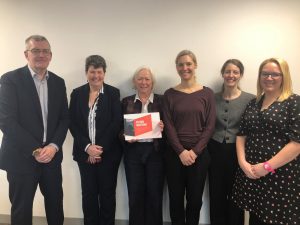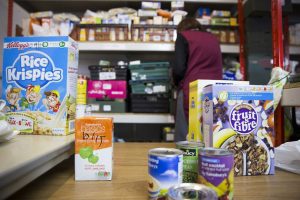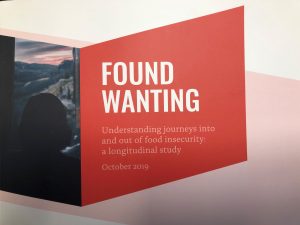A menu for change for Wales
Although the UK is one of the richest economies in the world, many people struggle to afford food. Last week, 40 people from across South Wales joined together at Tai Calon Housing Association in Blaenau Gwent to discuss food insecurity.

Food banks are becoming an all too familiar part of life in Wales, and too many people are forced to choose between heating and eating. The ever-rising use of food banks is morally unjustifiable in a country where food is plentiful. Food insecurity is caused by too much poverty, not too little food.

In Wales today, 24% of people are living in poverty, and this figure has remained largely unchanged for a decade. In 2017-18, 98,350 three-day emergency food supplies were provided to people in crisis in Wales by Trussell Trust food banks – and of these 35,403 went to children.
The picture in Scotland is similar, and food bank usage is rising. The ‘Menu for Change’ project was set up in Scotland in 2017. It aimed to reduce the need for emergency food aid in Scotland by improving access to financial advice and support when people were experiencing food insecurity and financial crises. The project developed a range of policy recommendations aimed at different levels of government – all relate back to three over-arching calls:
- Ensure adequate and secure incomes;
- Improve dignified access to cash and advice in a crisis;
- Deliver holistic, empathetic public services that treat people with kindness and respect.

The event allowed representatives from local authorities, food banks, and other community organisations to discuss how the outcomes and learning from A Menu for Change could be applied in South Wales. Several key themes were highlighted during the discussion which centred around: the importance of a place-based approach and putting the voice of lived experience at the heart of any response; the need to identify where advice sits, and where the safe spaces are for people to access advice – ensuring that every contact made counts; the need to increase levels of trust of advice provided by authorities; looking to businesses for what more they can do, for example, in supporting new start-ups, and working with local authorities to address food waste; the urgent need for decent work in the area; and the for those facing in-work poverty; but ultimately to reduce the need for food banks.
South Wales has huge strengths to tackle food insecurity – lots of ‘acorns’: a strong third sector network, a network of community centres, pantries and community cafes, volunteers, an integrated wellbeing network, and hyperlocal projects addressing local needs – but these must be complemented by decisive action from governments and business.
The Wellbeing of Future Generations Act in Wales provides the framework for public bodies to address this – a prosperous Wales, a healthier Wales, a more equal Wales. Oxfam is grateful to the Blaenau Gwent Public Service Board for their support in organising this event.
A Menu for Change was delivered by Oxfam Scotland, Child Poverty Action Group in Scotland, the Poverty Alliance, and Nourish Scotland, funded by the National Lottery through the Community Fund. Full details of the project can be found at https://menuforchange.org.uk/.
We won’t live with poverty.
Rachel Cable, Oxfam Cymru.